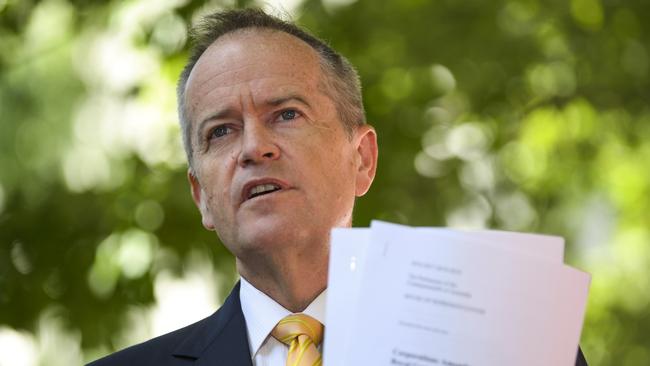Labor moves on banking royal commission findings
Bill Shorten has ramped up pressure on the government to ban grandfathered trailing commissions on a faster schedule.

Bill Shorten has ramped up pressure on the government to ban grandfathered trailing commissions collected by financial advisers on a faster schedule, as Labor unveiled three pieces of legislation tied to royal commission recommendations it claimed could be made law this week.
Labor will move the three private member’s bills in parliament today to enact five key recommendations of the banking royal commissions, including ending grandfathered commissions a year earlier than the Morrison government has scheduled, removing the exemption for insurers from fair claims handling provisions in the law, removing the point of sale exemption for some credit products such as car loans and clamping down on a loophole that has been exploited by funeral insurance groups that target Indigenous Australians.
A further bill would force banks to share information with the new Australian Financial Complaints Authority, which is the main dispute resolution for jilted customers. The bills were reviewed by Victorian QC Ray Finkelstein.
The opposition leader said Labor would be announcing further responses to Kenneth Hayne’s royal commission recommendations over coming days. The government released its own response to the 76 recommendations on the day it released the final report, in which it committed to implementing most of the proposals, while giving qualified support to others.
“Labor has written the laws to start implementing the Banking Royal Commission,” Mr Shorten said in Canberra today.
“Now, we make this request of the current government, set some sitting days in parliament so that we can deal with the laws. “These new laws go towards protecting people against dodgy car loans,” he said.
“They go to protect people against funeral insurance rip-offs. They go to protecting people against poor insurance claims handling.”
The Morrison government has seen through the passage of tougher corporate penalties legislation, after it agreed to Labor amendments that will see corporate executives locked away for as long as 15 years and fines whacked on companies up to $525 million for civil breaches of the law.
The powers at ASIC’s disposal were also boosted by the passage of two of Commissioner Hayne’s recommendations which will attach criminal and civil penalties to breaches of the law where superannuation directors fail to act in the best interests of members and where trustees strike dodgy deals with employers to win lucrative contracts to manage worker savings.
Josh Frydenberg has also pledged to revive parts of the government’s legislation clamping down on a $3bn life insurance fee gouge in superannuation by ending automatic cover for members under 25.
However, a fight between Labor and the government looms over the banning of grandfathered trailing commissions and the response to a proposal to end trailing commissions for mortgage brokers.
“The Royal Commission recommended that grandfathered commissions for planners be removed ‘As soon as practicable’,” Chris Bowen said. “As soon as practical. The government’s response says they’ll get around to it on January 1, 2021. That’s not as soon as practical. We believe it can be done on January 1, 2020, and it legislated now,” the opposition treasury spokesman said.
“It’s straightforward legislation which can be achieved now. It can be achieved a full 12 months in advance of what the Government’s proposed timetable is.”
Opposition financial services spokeswoman Clare O’Neil said Labor was not walking away from its pledge to get cracking on ending the hawking of superannuation.
“What we have done is picked out the changes that we think are most straightforward, most simple and not open to debate,” O’Neil said.
“With Hawking, there are some complexities there so we need to take a little bit more time. We’re not stepping back from that. We are responsible about how we want to do this, but we shun use being responsible as an excuse not to take action where we clearly can,” she said.
Mr Hayne in his final report said when the grandfathering arrangements were first introduced, “participants in the industry could say that sudden change in remuneration arrangements may bring untoward consequences for countervailing benefits that would not outweigh the harms of disruption”.
“Even if the arguments relied on to justify the grandfathering exception were valid when that exception was introduced, it is now clear that they have outlived their validity,” Mr Hayne said.
Although many larger institutions have pledged to ban grandfathered commissions, the sector needs the government to pass laws that will end the $400 million in grandfathered trailing commissions being siphoned out of the retirement savings of hundreds of thousands of members every year.
The royal commission published the commissions charged by the for-profit super sector before they moved to end the lucrative kickbacks, which includes about $50m to members of the scandal-ridden AMP, $30m by Commonwealth Bank’s Colonial First State, and about $20m by Westpac’s BT Financial. National Australia Bank’s MLC division sucked out about $40m in commissions, while IOOF took in about $15m in commissions that crimp the possibility of higher retirement balances.




To join the conversation, please log in. Don't have an account? Register
Join the conversation, you are commenting as Logout